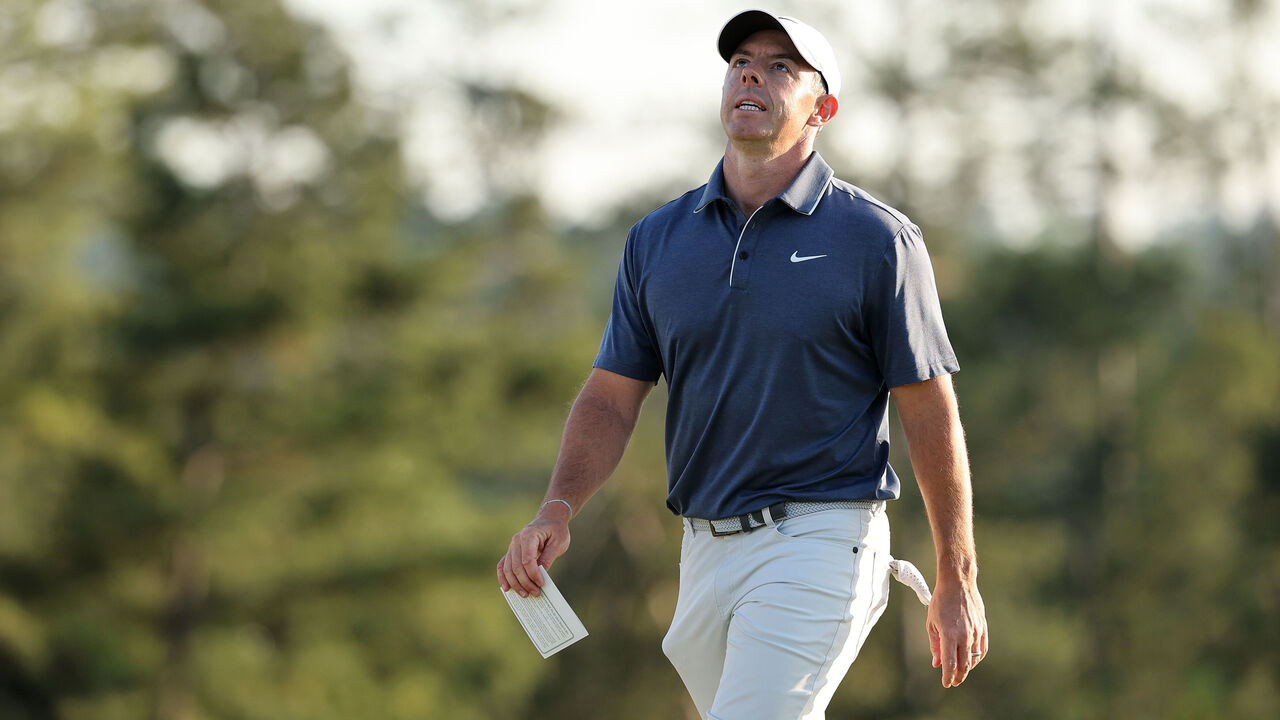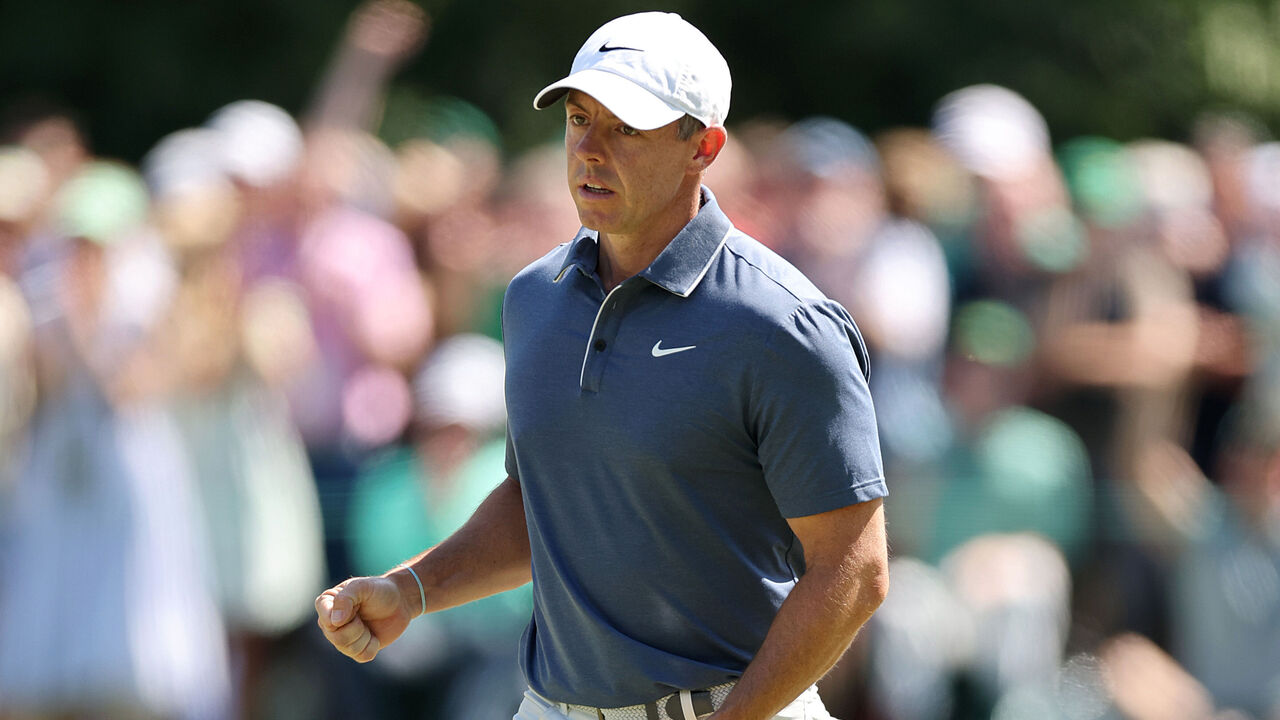Never easy, never boring: Rory finally gets his Masters
When Wyndham Clark emerged on the final day of the 2023 U.S. Open Championship to beat Rory McIlroy by one stroke, the runner-up put the difficult day into perspective.
"I would go through 100 Sundays like this to get my hands on another major championship," McIlroy said.
For a large portion of Sunday's final round at the Masters, it looked as though he was going through yet another of those collapses. However, it turns out his major wins are simply destined to finish in the same style as his close losses - never easy, never boring.
If there's one thing we've learned through the last decade of the 35-year-old's career, it's that the drama will be heavy when he's attempting to close out a tournament.
Perhaps that's what makes him one of the most popular players in the game. He can do superhuman things that normal people can only dream of and then make a mistake you'd see at your local municipal course just seconds later.

In what was one of the wildest days in the history of the Masters, McIlroy somehow spent the entire round going back and forth between agony and ecstasy. It's tough to put into words the outrageous swings we witnessed throughout the day, but here's a list of the various scenarios in which he found himself:
- Led by two entering the day
- Trailed by one after two holes
- Led by three after four holes
- Led by four after the first nine
- Trailed by one after the 14th
- Led by one after the 17th
- Bogeyed 18 to fall into a playoff
- Won the playoff on first hole
Never easy, never boring.
The major heartbreaks that McIlroy experienced in recent years felt very fresh as he teed off Sunday at Augusta National. The quest for a career grand slam and an 11-year major drought are a heavy burden to carry, especially with the demons of 14 years ago at the same venue still burning bright.
For those needing a refresher, McIlroy took a four-shot lead into Sunday at the Masters as a 21-year-old. But what was supposed to be the coronation of the greatest talent since Tiger Woods ended as a horror show, as a final-round 80 sent him crashing to 15th place. It's a result he's had to answer for seemingly every time he's come to Augusta.
With a double-bogey on the opening hole Sunday, it appeared he was once again heading down the same road.
However, McIlroy is nowhere near the same person or player he was in 2011. His mental game has grown exponentially, and the current version of McIlroy has the mental fortitude to match his immense physical gifts and forget the most humbling of experiences in a heartbeat.
How else do you explain the birdies on Nos. 3 and 4 that turned a one-stroke deficit into an immediate three-shot lead? After another birdie at No. 9, he held a four-shot lead heading to the second nine. While many would feel fairly comfortable with that spread, this is McIlroy at a major, and with DeChambeau lurking, the memory of last year's U.S. Open was all too prevalent.
The first sign this might not be a two-hour celebration of McIlroy came at the 13th, where he produced one of the most mind-blowing wedge shots ever seen. Even in the cauldron of major championship golf, a top-level professional can hit 100 wedge shots from 86 yards and not lose one 15 yards to the right of his target. But McIlroy somehow hit his approach into Rae's Creek and walked away with his fourth double-bogey of the week.
Never easy, never boring.
Another bogey on the 14th and suddenly the four-shot lead he held was a one-shot deficit to a 44-year-old Justin Rose, who was playing out of his mind on the second nine.
That's when McIlroy unleashed an outrageous 209-yard approach to the par-5 15th that hooked some 30 yards to the left and settled six feet from the hole for eagle. While he missed the putt, the ensuing birdie saw him reach 11-under - the number Rose had posted after a birdie on the 18th hole.

One more birdie would secure the win for McIlroy in regulation, and the 17th provided the canvas for the artist to paint. A towering 198-yard approach to two feet saw him move one clear with just the 18th to play. After splitting the fairway, he surely had one arm in the green jacket with just a wedge left to the green.
But he lost another wedge to the right, this time in the bunker, and was unable to make par. That pushed him back to the 18th tee for a sudden-death playoff with Rose. After an 11-year wait to end the major drought, a 73rd hole must have seemed like another decade.
Never easy, never boring.
A repeat drive left him with almost the exact same number for his approach to the green, and this time he rose to the moment, spinning his wedge back to two feet. After Rose's birdie putt missed to the right, McIlroy stroked his in and collapsed out of exhaustion, relief, and sheer elation.
The scenes at Augusta following the victory reached a volume we haven't witnessed since Tiger Woods' historic victory in 2019.
There were many times throughout the day where it looked like McIlroy would run away with the win. That's what he did in his first three major titles before the age of 25.
However, the talent pool in golf is significantly better now than when he could go supernova on a field with less than his A-game. It's heightened the degree of difficulty in closing out a tournament and is partially to blame for his major title drought.
Never easy, never boring. But after Sunday, he probably wouldn't want it any other way.
HEADLINES
- Koepka leaving LIV Golf to be closer to home
- Pereira retires at 30 just 3 years after nearly winning PGA Championship
- Gerard's payoff for flying across 2 oceans, 2 seas is Masters invitation
- Kuchar lost his father in February, ends year with PNC win alongside son
- Masters fields reaches 86 players with 13 from world ranking